Cheeseburgers can vary in cholesterol content depending on the type and size. A plain cheeseburger on a bun typically contains around 50 mg of cholesterol. Double cheeseburgers can have higher cholesterol levels, with some variations reaching over 200 mg. Popular fast-food chains like McDonald’s, Wendy’s, and Burger King offer cheeseburgers with varying cholesterol levels.
In terms of overall nutrition, cheeseburgers can be high in calories, fats, sodium, and carbohydrates. The calorie content can range from around 300 to 500 calories, depending on the size and ingredients. Protein content is moderate, with an average single-patty cheeseburger containing around 15 grams of protein. The bun contributes most to the carbohydrate content of a cheeseburger.
Cheeseburgers can be a significant source of fat, both saturated and unsaturated, due to the meat, cheese, and any added sauces or dressings. Sodium content can be high due to the processed nature of the ingredients. While the sugar content is not significant, it can be present in cheeseburgers, particularly if sauces or pickles are added.
Cheeseburgers can provide essential nutrients such as iron from the meat and calcium from the cheese. However, regularly consuming high-calorie, high-fat foods like cheeseburgers can have negative effects on health, contributing to conditions like obesity, heart disease, and high blood pressure.
The cooking method, type of cheese used, and choice of toppings can also impact the nutritional profile of a cheeseburger. Gluten is present in the bun, making it unsuitable for those with celiac disease or gluten intolerance. Vegetarian and vegan alternatives to cheeseburgers are available but should be consumed in moderation as they can contain high calorie, salt, and fat levels.
In conclusion, while cheeseburgers can be a delicious comfort food, they should be consumed in moderation and as part of a balanced diet. Understanding the nutritional facts and considering the impact on health is important when enjoying this classic American dish.
Key Takeaways:
- Cheeseburgers can vary in cholesterol content, with plain options typically containing around 50 mg and double cheeseburgers potentially surpassing 200 mg.
- Cheeseburgers are high in calories, fats, sodium, and carbohydrates, with calorie content ranging from 300 to 500 calories.
- The fat content in cheeseburgers comes from the meat, cheese, and additional sauces, while sodium content is high due to processed ingredients.
- Regularly consuming high-calorie, high-fat foods like cheeseburgers can contribute to obesity, heart disease, and high blood pressure.
- The nutritional profile of a cheeseburger can be influenced by cooking methods, cheese choices, toppings, and the presence of gluten in the bun.
Please note that the image placement may not be visually appealing in this plain text format, but it should be centered in the final HTML layout.
In terms of overall nutrition, cheeseburgers can be high in calories, fats, sodium, and carbohydrates. The calorie content can range from around 300 to 500 calories, depending on the size and ingredients. Protein content is moderate, with an average single-patty cheeseburger containing around 15 grams of protein. The bun contributes most to the carbohydrate content of a cheeseburger.
Cheeseburgers can be a significant source of fat, both saturated and unsaturated, due to the meat, cheese, and any added sauces or dressings. Sodium content can be high due to the processed nature of the ingredients. While the sugar content is not significant, it can be present in cheeseburgers, particularly if sauces or pickles are added.

Cheeseburgers can provide essential nutrients such as iron from the meat and calcium from the cheese. However, regularly consuming high-calorie, high-fat foods like cheeseburgers can have negative effects on health, contributing to conditions like obesity, heart disease, and high blood pressure. The cooking method, type of cheese used, and choice of toppings can also impact the nutritional profile of a cheeseburger. Gluten is present in the bun, making it unsuitable for those with celiac disease or gluten intolerance. Vegetarian and vegan alternatives to cheeseburgers are available but should be consumed in moderation as they can contain high calorie, salt, and fat levels.
Understanding the Fat Content in Cheeseburgers
Cheeseburgers can be a significant source of fat, both saturated and unsaturated, due to the meat, cheese, and any added sauces or dressings. Saturated fats, found primarily in animal products like beef and cheese, are known to raise cholesterol levels and increase the risk of heart disease when consumed in excess. Unsaturated fats, on the other hand, are considered healthier fats and can have a positive impact on heart health when consumed in moderation.
When it comes to cheeseburgers, the fat content can vary depending on the type of meat and cheese used. Ground beef with a higher fat percentage will contribute more saturated fat to the burger, while leaner cuts of beef will have a lower fat content. The type of cheese chosen can also affect the fat content, with options like cheddar and American cheese typically containing higher fat levels.
| Ingredient | Saturated Fat (g) | Unsaturated Fat (g) |
|---|---|---|
| Ground Beef (80% lean) | 6.9 | 4.0 |
| Ground Beef (90% lean) | 2.6 | 5.7 |
| American Cheese (1 slice) | 4.5 | 2.8 |
| Cheddar Cheese (1 slice) | 6.2 | 2.6 |
It’s important to manage the fat content in cheeseburgers to maintain a healthy diet. Opt for leaner cuts of beef or consider alternative meat options like turkey or chicken patties. Choose low-fat or reduced-fat cheese options to cut down on saturated fat intake. Additionally, be mindful of added sauces and dressings, as they can contribute to the overall fat content of the burger.
By being aware of the fat content in cheeseburgers and making informed choices, we can enjoy this American favorite while still maintaining a balanced and healthy diet.
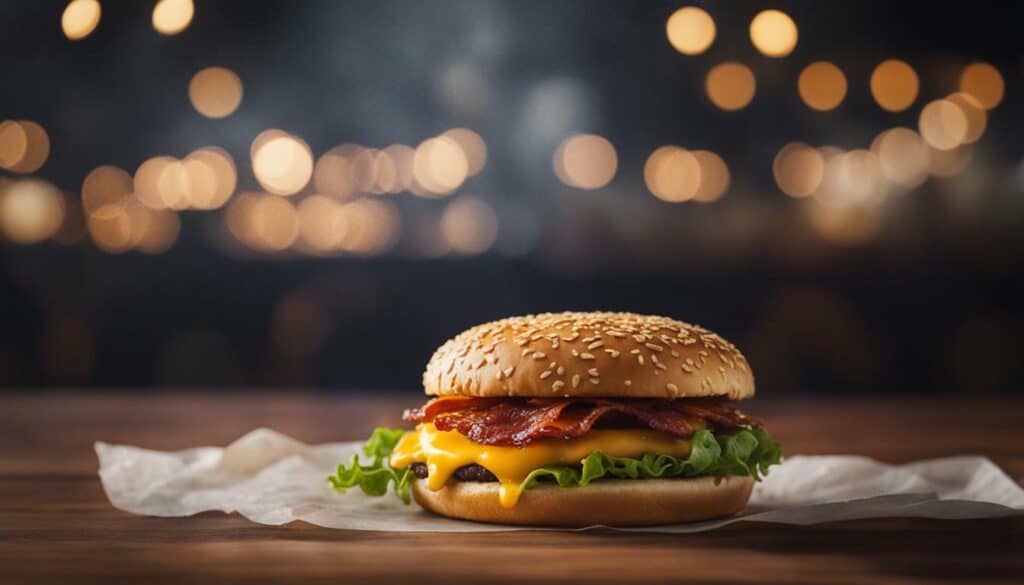
Regularly consuming high-calorie, high-fat foods like cheeseburgers can have negative effects on health, contributing to conditions like obesity, heart disease, and high blood pressure. The excessive intake of cholesterol-rich cheeseburgers, especially those with multiple patties and added toppings, can lead to elevated levels of LDL cholesterol, commonly known as “bad” cholesterol. When LDL cholesterol levels are high, it can build up in the arteries, causing plaque formation and narrowing of the blood vessels. This condition, known as atherosclerosis, increases the risk of heart disease and can eventually lead to heart attacks or strokes.
Studies have shown that a diet high in saturated and trans fats, as often found in cheeseburgers, can raise levels of LDL cholesterol and lower levels of HDL cholesterol, which is the “good” cholesterol that helps remove LDL cholesterol from the bloodstream. This imbalance in cholesterol levels further increases the risk of heart disease.

Additionally, the high sodium content in cheeseburgers can contribute to hypertension, a condition characterized by high blood pressure. Excess sodium intake can cause the body to retain water, leading to increased blood volume and strain on the heart. Over time, this can result in the development of hypertension, which is a significant risk factor for heart disease.
To mitigate the potential health risks associated with cheeseburgers, it is important to consume them in moderation and make healthier choices when possible. Opting for leaner cuts of meat, reducing the amount of cheese and sauces, and choosing whole-grain buns can help lower the saturated fat and calorie content of a cheeseburger. Additionally, incorporating more fruits, vegetables, and whole foods into your diet can provide important nutrients and support heart health.
Factors Affecting the Nutritional Profile of Cheeseburgers
The cooking method, type of cheese used, and choice of toppings can also impact the nutritional profile of a cheeseburger. Let’s dive deeper into how these factors can influence the overall healthiness of this classic American dish.
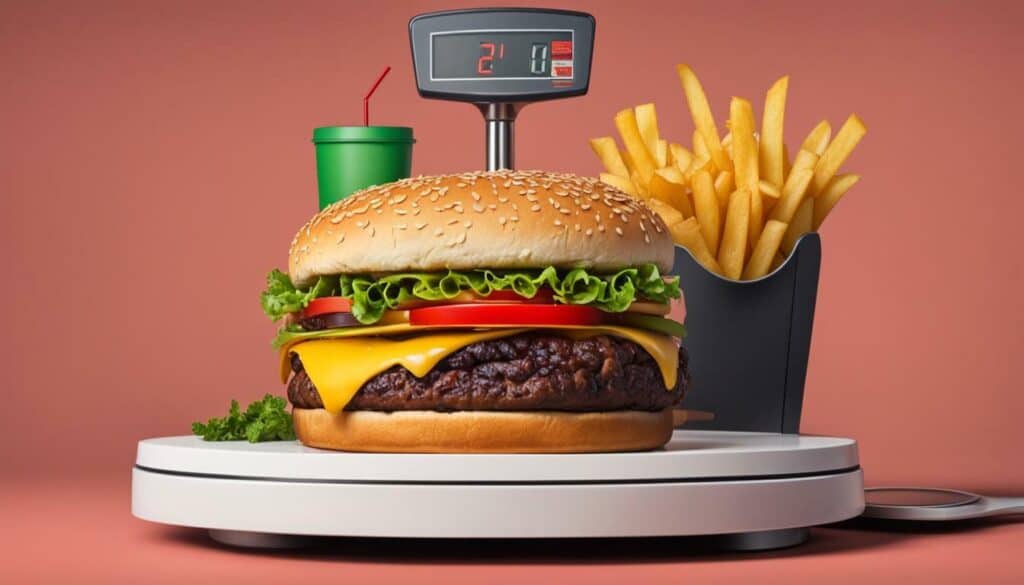
Cooking Method: The way a cheeseburger is cooked can significantly affect its nutritional content. Grilling or baking the burger patty can help reduce the amount of added fats, as compared to frying. This method allows excess fat to drip away, resulting in a lower overall fat content. Similarly, opting for a whole-grain bun instead of a white bun can increase the fiber content of the cheeseburger.
Type of Cheese: The choice of cheese used in a cheeseburger can impact its nutritional value. Some cheeses, like cheddar or Swiss, can be higher in fat and sodium compared to other varieties. However, there are also lower-fat options available, such as reduced-fat or part-skim cheese. Choosing these alternatives can help reduce the overall fat and calorie content of the cheeseburger.
Choice of Toppings: The toppings added to a cheeseburger can significantly affect its nutritional profile. Opting for fresh lettuce, tomatoes, onions, and pickles can add fiber, vitamins, and minerals to the burger. However, toppings like mayonnaise, ketchup, and high-fat sauces can increase the calorie and fat content. Choosing lighter alternatives or limiting the amount of these condiments can make a cheeseburger a healthier choice.
Table 1: Nutritional Comparison of Different Cheeseburger Toppings
| Topping | Calories | Total Fat (g) | Saturated Fat (g) | Sodium (mg) |
|---|---|---|---|---|
| Lettuce, tomato, onion | 20 | 0 | 0 | 5 |
| Mayonnaise (1 tbsp) | 90 | 10 | 1.5 | 90 |
| Ketchup (1 tbsp) | 20 | 0 | 0 | 160 |
| BBQ sauce (1 tbsp) | 60 | 0.5 | 0 | 200 |
As observed in Table 1, choosing toppings like lettuce, tomato, and onion can offer minimal calories and fat while providing added freshness and nutrition. On the other hand, condiments like mayonnaise and BBQ sauce can significantly increase calorie and fat intake.
- Tip: Opt for lighter toppings and condiments to keep your cheeseburger healthier and more nutritious.
- Quote: “The choice of cheeseburger toppings can make a substantial difference in its nutritional value, so choose wisely,” said Dr. Mark Johnson, a nutrition specialist.
By considering factors such as the cooking method, type of cheese, and choice of toppings, you can customize your cheeseburger to be a more balanced and nutritious option. Making conscious decisions about these elements can help you enjoy the flavors of a cheeseburger while being mindful of your dietary choices.
Cheeseburgers as a Source of Essential Nutrients
Cheeseburgers can provide essential nutrients such as iron from the meat and calcium from the cheese. These nutrients play crucial roles in maintaining overall health and well-being. Iron is essential for the production of red blood cells, which help transport oxygen throughout the body. Calcium is important for strong bones and teeth, as well as proper muscle function. Including cheeseburgers in your diet, in moderation, can contribute to meeting your nutritional needs.
However, it is important to note that while cheeseburgers can offer some essential nutrients, they also come with potential health risks due to their high calorie and fat content. It is crucial to make informed choices and manage the cholesterol in cheeseburgers to avoid negative health outcomes.
To help you better understand the nutritional profile of a cheeseburger, here is a table summarizing the key nutrient content:
| Nutrient | Content per serving |
|---|---|
| Calories | Average 300-500 |
| Protein | Average 15 grams |
| Iron | Varies based on meat source |
| Calcium | Varies based on cheese type |
| Saturated Fat | Varies based on ingredients |
| Sodium | Varies based on ingredients |
Remember, enjoying a cheeseburger occasionally as part of a balanced diet can still fit into a healthy lifestyle. It’s all about moderation and making mindful choices to manage cholesterol levels and overall health.

Let’s dive deeper into the impact of cheeseburgers on heart health in the next section.
Alternatives to Traditional Cheeseburgers
Gluten-free and vegetarian alternatives to cheeseburgers are available but should be consumed in moderation. These options provide individuals with dietary restrictions or those looking for healthier alternatives a chance to enjoy a tasty burger without compromising their dietary choices.
One option is to replace the beef patty with a gluten-free or plant-based alternative. Gluten-free burger buns made from ingredients like rice flour or tapioca flour can be used to create a bun that is suitable for individuals with celiac disease or gluten intolerance. These buns can be found in specialty stores or made at home using gluten-free flour blends.
For those following a vegetarian or vegan diet, plant-based burger patties made from ingredients like black beans, lentils, or mushrooms can mimic the texture and flavor of traditional beef patties. These alternatives are often lower in calories and saturated fat, making them a healthier option for individuals concerned about their cholesterol and overall health.
| Traditional Cheeseburger | Gluten-Free Alternative | Vegetarian Alternative |
|---|---|---|
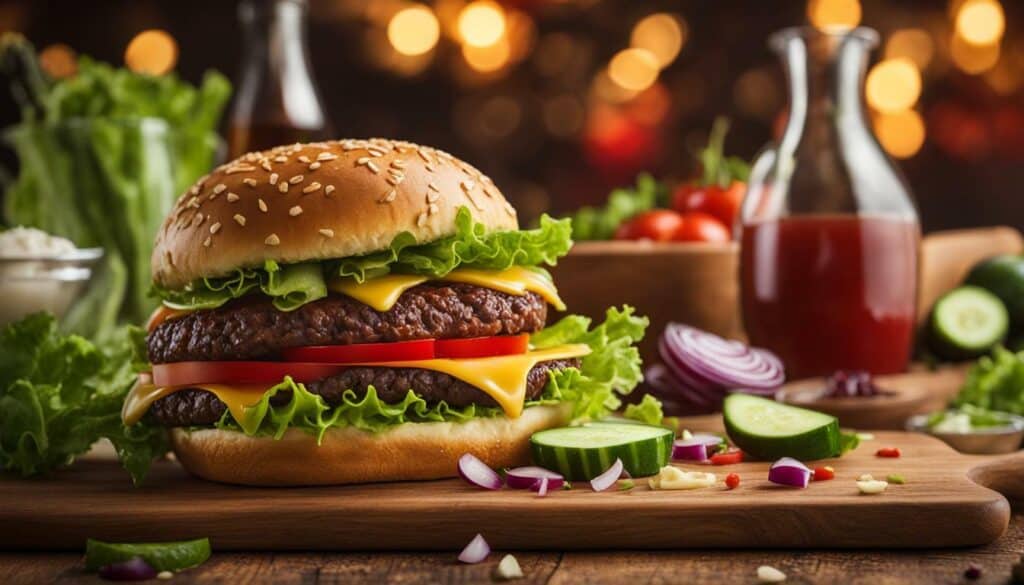 |  |  |
| Calories: 400 | Calories: 350 | Calories: 250 |
| Fat: 20g | Fat: 12g | Fat: 8g |
| Cholesterol: 50mg | Cholesterol: 0mg | Cholesterol: 0mg |
| Sodium: 600mg | Sodium: 450mg | Sodium: 400mg |
When opting for these alternatives, it is important to consider the nutritional content. While they may be lower in cholesterol and saturated fat, they can still contain significant amounts of sodium and calories. It is always advisable to read the nutrition label and choose options that fit within your dietary requirements and goals.
In summary, gluten-free and vegetarian alternatives to traditional cheeseburgers allow individuals with dietary restrictions or those seeking healthier options to still indulge in a delicious burger. These alternatives can provide similar flavors and textures while reducing cholesterol and saturated fat content. Remember to enjoy these alternatives in moderation and make choices that align with your nutritional needs.
The Role of Cheeseburgers in a Balanced Diet
While cheeseburgers can be a delicious comfort food, they should be consumed in moderation and as part of a balanced diet. Understanding the nutritional facts and considering the impact on health is important when enjoying this classic American dish.
Cheeseburgers can vary in cholesterol content depending on the type and size. A plain cheeseburger on a bun typically contains around 50 mg of cholesterol. Double cheeseburgers can have higher cholesterol levels, with some variations reaching over 200 mg. Popular fast-food chains like McDonald’s, Wendy’s, and Burger King offer cheeseburgers with varying cholesterol levels.
In terms of overall nutrition, cheeseburgers can be high in calories, fats, sodium, and carbohydrates. The calorie content can range from around 300 to 500 calories, depending on the size and ingredients. Protein content is moderate, with an average single-patty cheeseburger containing around 15 grams of protein. The bun contributes most to the carbohydrate content of a cheeseburger.
The Nutritional Profile of Cheeseburgers:
| Nutrient | Amount Per Serving |
|---|---|
| Calories | 300-500 |
| Fat | 15-30 grams |
| Sodium | 400-800 mg |
| Protein | 15 grams |
| Carbohydrates | 25-40 grams |
Cheeseburgers can be a significant source of fat, both saturated and unsaturated, due to the meat, cheese, and any added sauces or dressings. Sodium content can be high due to the processed nature of the ingredients. While the sugar content is not significant, it can be present in cheeseburgers, particularly if sauces or pickles are added.
Cheeseburgers can provide essential nutrients such as iron from the meat and calcium from the cheese. However, regularly consuming high-calorie, high-fat foods like cheeseburgers can have negative effects on health, contributing to conditions like obesity, heart disease, and high blood pressure.
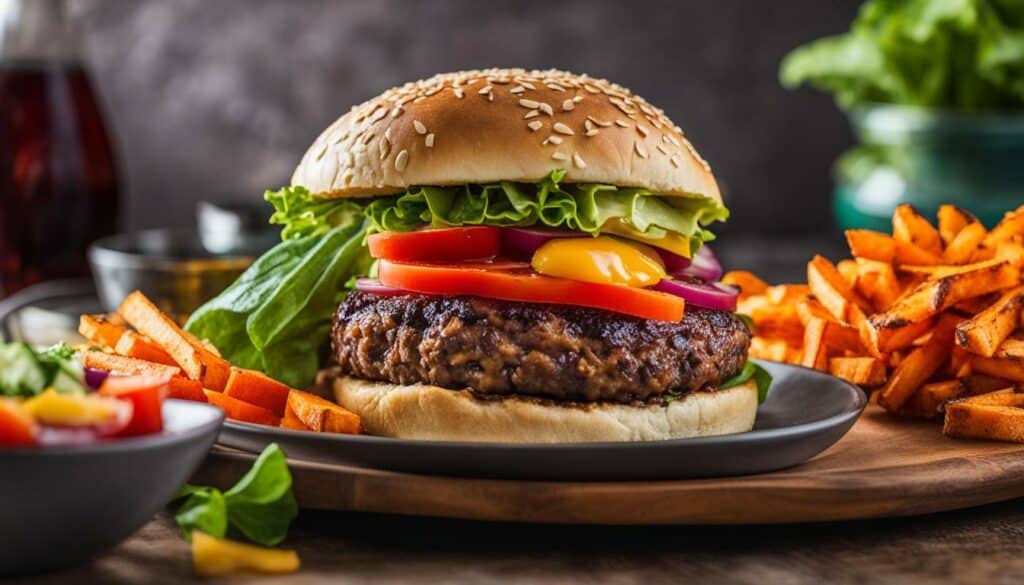
The cooking method, type of cheese used, and choice of toppings can also impact the nutritional profile of a cheeseburger. Gluten is present in the bun, making it unsuitable for those with celiac disease or gluten intolerance. Vegetarian and vegan alternatives to cheeseburgers are available but should be consumed in moderation as they can contain high calorie, salt, and fat levels.
While cheeseburgers can be a delicious comfort food, they should be consumed in moderation and as part of a balanced diet. Understanding the nutritional facts and considering the impact on health is important when enjoying this classic American dish.
Understanding Dietary Restrictions and Considerations
The bun in a cheeseburger contains gluten, making it unsuitable for those with celiac disease or gluten intolerance. However, there are gluten-free alternatives available, such as lettuce wraps or gluten-free buns, that can be enjoyed by individuals with dietary restrictions. It’s important to check with the restaurant or prepare your cheeseburgers at home using gluten-free ingredients to accommodate those with gluten sensitivities.
For individuals with high cholesterol or concerns about heart health, opting for leaner meats, such as turkey or chicken, can be a healthier choice. These alternatives can help reduce the saturated fat content in the cheeseburger while still providing a flavorful and satisfying meal. Additionally, using low-fat cheese or skipping it altogether can further lower the cholesterol content of the cheeseburger.
Vegetarian and vegan cheeseburgers are also available for those who follow plant-based diets or have dietary restrictions related to animal products. These alternatives often use plant-based proteins like tofu, tempeh, or legumes to mimic the texture and taste of meat. However, it’s important to note that some vegetarian or vegan cheeseburgers can still be high in calories, salt, and fat, especially if they are heavily processed or loaded with sauces and toppings.
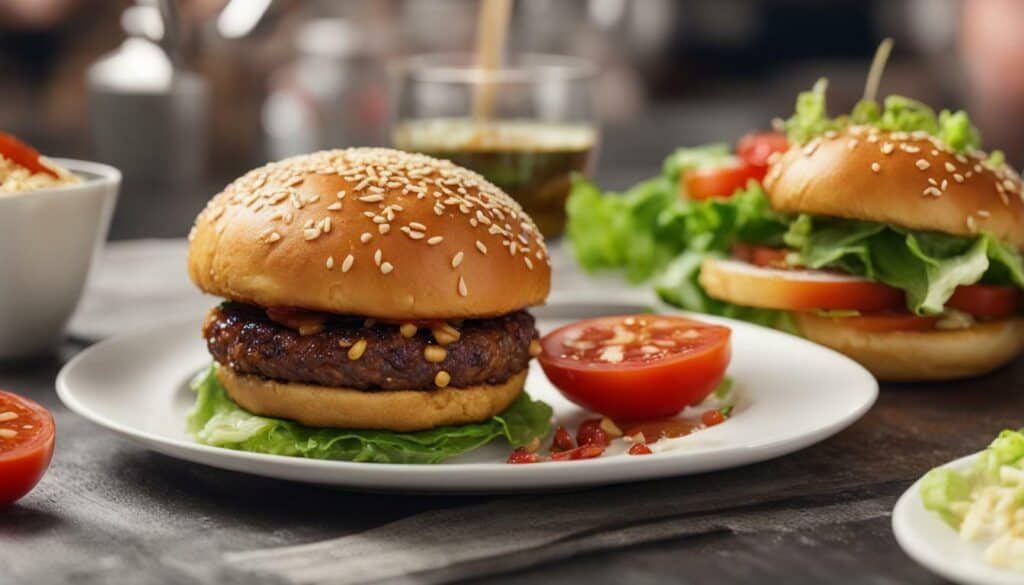
When making dietary choices, it’s essential to consider the nutritional profile of the cheeseburger as a whole. This includes paying attention to portion sizes, the quality of ingredients used, and the overall balance of the meal. Incorporating plenty of fresh vegetables as toppings and choosing whole-grain buns or wraps can increase the fiber content and provide additional nutrients.
Ultimately, understanding dietary restrictions and making informed choices is vital for maintaining a healthy and balanced diet. By considering individual needs, preferences, and health goals, individuals can enjoy cheeseburgers while still prioritizing their well-being. Remember, moderation is key in all aspects of our diet, including indulging in the occasional cheeseburger.
Conclusion
In conclusion, while cheeseburgers can be a delicious comfort food, they should be consumed in moderation and as part of a balanced diet. It’s important to understand the nutritional facts and consider the impact on health when enjoying this classic American dish.
Cheeseburgers can vary in cholesterol content depending on the type and size. A plain cheeseburger on a bun typically contains around 50 mg of cholesterol. Double cheeseburgers can have higher cholesterol levels, with some variations reaching over 200 mg. Popular fast-food chains like McDonald’s, Wendy’s, and Burger King offer cheeseburgers with varying cholesterol levels.
In terms of overall nutrition, cheeseburgers can be high in calories, fats, sodium, and carbohydrates. The calorie content can range from around 300 to 500 calories, depending on the size and ingredients. Protein content is moderate, with an average single-patty cheeseburger containing around 15 grams of protein. The bun contributes most to the carbohydrate content of a cheeseburger.
Cheeseburgers can be a significant source of fat, both saturated and unsaturated, due to the meat, cheese, and any added sauces or dressings. Sodium content can be high due to the processed nature of the ingredients. While the sugar content is not significant, it can be present in cheeseburgers, particularly if sauces or pickles are added.
Cheeseburgers can provide essential nutrients such as iron from the meat and calcium from the cheese. However, regularly consuming high-calorie, high-fat foods like cheeseburgers can have negative effects on health, contributing to conditions like obesity, heart disease, and high blood pressure.
The cooking method, type of cheese used, and choice of toppings can also impact the nutritional profile of a cheeseburger. Gluten is present in the bun, making it unsuitable for those with celiac disease or gluten intolerance. Vegetarian and vegan alternatives to cheeseburgers are available but should be consumed in moderation as they can contain high calorie, salt, and fat levels.
While cheeseburgers may be a popular indulgence, it is important to make informed choices and ensure they fit into a well-balanced diet. Moderation is key when it comes to enjoying cheeseburgers and managing cholesterol intake. By understanding the nutritional content and considering the potential health risks, individuals can make better dietary decisions and maintain a healthy lifestyle.
FAQ
Q: How much cholesterol does a plain cheeseburger contain?
A: A plain cheeseburger on a bun typically contains around 50 mg of cholesterol.
Q: Can double cheeseburgers have higher cholesterol levels?
A: Yes, double cheeseburgers can have higher cholesterol levels, with some variations reaching over 200 mg.
Q: What is the calorie content of cheeseburgers?
A: The calorie content of cheeseburgers can range from around 300 to 500 calories, depending on the size and ingredients.
Q: How much protein does a single-patty cheeseburger contain?
A: An average single-patty cheeseburger contains around 15 grams of protein.
Q: What contributes most to the carbohydrate content of a cheeseburger?
A: The bun contributes most to the carbohydrate content of a cheeseburger.
Q: Are cheeseburgers high in fat?
A: Yes, cheeseburgers can be a significant source of fat, both saturated and unsaturated, due to the meat, cheese, and any added sauces or dressings.
Q: Why is sodium content high in cheeseburgers?
A: Sodium content can be high in cheeseburgers due to the processed nature of the ingredients.
Q: Do cheeseburgers contain sugar?
A: While the sugar content is not significant, it can be present in cheeseburgers, particularly if sauces or pickles are added.
Q: What essential nutrients do cheeseburgers provide?
A: Cheeseburgers can provide essential nutrients such as iron from the meat and calcium from the cheese.
Q: Are there vegetarian or vegan alternatives to cheeseburgers?
A: Yes, vegetarian and vegan alternatives to cheeseburgers are available, but they should be consumed in moderation as they can contain high calorie, salt, and fat levels.
Q: How should cheeseburgers be consumed?
A: Cheeseburgers should be consumed in moderation and as part of a balanced diet, considering their nutritional profile and impact on health.
Q: Are cheeseburgers suitable for those with gluten intolerance?
A: No, cheeseburgers contain gluten in the bun, making them unsuitable for those with celiac disease or gluten intolerance.
Are Cheeseburgers from Fast Food Chains High in Cholesterol?
Are cheeseburgers from fast food chains high in cholesterol? The answer lies in fast food calories decoded. While cheeseburgers are indeed known to be high in cholesterol, the actual amount can vary depending on the specific ingredients and preparation methods used by different chains. Being mindful of portion sizes and opting for healthier alternatives can help in managing cholesterol intake.





Leave a Reply